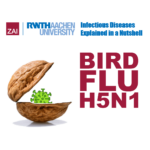Schlagwort: ‘malaria’
April 25: World Malaria Day 2023
Three Is against malaria
The world malaria report 2022 of the world health organization (WHO) states that in 2021 an estimated 247 million people were infected with malaria in 84 countries around the world with a death toll of about 619 000 people. Despite huge efforts in the eradication of the disease and constant dropping numbers throughout the last decades, levels of disease burden are still high. Especially in remote and rural areas of the tropics people are at risk without having access to appropriate prevention and health care. Among the most vulnerable groups are primarily children.
Time to deliver zero malaria: invest, innovate, implement
Therefore, each year the WHO hosts the World Malaria Day on April 25. It is a political statement to persistently raise awareness and funds for treatment and prevention. Only a continuing worldwide effort can lead to the global eradication of malaria, since risk areas include the worlds poorest countries with no access to or ressources for high-tech diagnostics, powerful medical treatments and secure life styles. This year’s World Malaria Day has been themed „Time to deliver zero malaria: invest, innovate, implement“ which comprises WHO’s goal to reduce human malaria cases to zero by
- investing in and prioritizing efforts to protect hard-to-reach and marginalized populations,
- push innovation of mosquito control, diagnostics and medical treatment,
- implementing the strategies we already have at our hands.
Who’s the killer?
Now we know that malaria kills a lot of people and causes even more disease. But what kind of agent causes malaria, how does it get into your body and what does it do there to make you feel sick? Learn about the nature and the progression of the disease, in the informative and entertaining video clip by the amazing Armando Hasudungan:
With effective drugs at hands, is malaria still so dangerous?
Successful antimalarial drugs were the hope of the last century. Unfortunately, the malaria parasite reliably develops resistance to standard drugs. This puts researchers and health officials in a constant battle to find novel drug targets within the cellular structures and the reproduction cycle of the plasmodium parasites.
Listen to Marco de Ambrogi from The Lancet Infectious Diseases talking to researcher Rob W van der Pluijm from the Centre for Tropical Medicine and Global Health at Oxford University about the situation in South East Asia:
The Lancet – Antimalarial resistance in South East Asia
(This recording is part of a podcast series of The Lancet Infectious Diseases, where among other things scientists are asked to comment on the impact of their findings.)
Vaccines – the silver lining?
But there is a new hope: a newly developed vaccine showed siginificant protection against disease in pilot studies among children in Africa. The first malaria vaccine known under the unwieldy term „RTS,S“ achieved substantial reduction of fatal malaria cases among those children. This encouraged WHO to recommend a wider use of the vaccine across high risk areas. Further studies need to determine the full efficacy and safety profile of the protection, but first steps have been made. Researchers are now aiming at reducing the numbers of shots needed for full protection and global health officials are working on a programm for efficient distribution to the vulnerable population.
More vaccine candidates are in development and even have reached clinical trials adding to the world’s arsenal to defeat malaria, maybe for good. Also BioNTech works on a malaria vaccine termed „BNT165“ based on the mRNA-technology that already came to use in Pfizer-BioNTech’s famous COVID-19 vaccine. Investing in innovation has already paid off. Let’s follow that path.
#endgamemalaria






